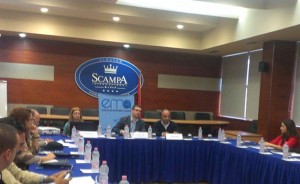Environment Pollution in Albania and European Standards
 On 7 October 2015 European Movement in Albania (EMA) in partnership with Slovak Foreign Policy Association, with the support of the Ministry of Environment, Forestry and Water Administration organized in Elbasan the Session II of Working Group IV “Environmental Pollution in Albania and the European Standards”.
On 7 October 2015 European Movement in Albania (EMA) in partnership with Slovak Foreign Policy Association, with the support of the Ministry of Environment, Forestry and Water Administration organized in Elbasan the Session II of Working Group IV “Environmental Pollution in Albania and the European Standards”.
Mr. Gledis Gjipali, Executive Director of European Movement Albania, introduced the objective and the function of Convention on European Integration, in achieving a closer cooperation between state institutions, NGO-s and interest groups. He attributed the Convention and these Sessions as a communication bridge and a demanding process for a further progress in Albanian integration process, mentioning an opportunity for more shared information, increase of capacity building and progress on reforms. Mr. Gjipali highlighted that the recommendations provided by the Working Groups sessions will be sent to the state institutions and relevant ministries, and also to the EU Delegation in Albania, for concrete measures and reform fulfillment.
Mrs. Holta Ymeri, WG Expert of EMA, made a clear and technical introduction regarding pollution in Albania and after that, she presented a comparative analysis of Albanian legislation and EU legislation. During her speech she classified the types of pollution and their levels of impact in Albania, using specific examples for each case. Based on the Annual Report of National Agency of Environment 2014, she underlined some of the severe problems found during the studies about the pollution of Water, Land and the Air. Mrs. Ymeri explained that the Waste Management represents a major problem, because of the most used technique of landfill, which increases the level of risk in environment and citizens. In the second part of the presentation, Mr. Ymeri’s focus was on analysing the EU standards and explaining its legislation, more specifically two directives on Environment: 1) Directive of 2004, which regulates civil and administrative responsibility of polluters, that ate liable only if they are guilty and the pollution comes as a consequence of their activity. Also this directive attributes to the NGO-s right to ask the state to react when such activities occur. 2) Directive of 2008 makes the protection of environment part of penal legislation, binding the member states to create a list of environmental violations, which are set as criminal actions. To Mrs. Ymeri, these directives are also included in Albanian legislation, assessing this legislation as rich and which comprise all the environmental areas. Concluding, the expert of the WG IV noted that environmental rights are associated with the Human Rights, despite the fact there are not directly linked, many environmental issues bring infringement of human rights, and the only solution is to resolve the environmental problems based on these rights.
The other expert of EMA Working Group, Mr. Florian Xhafa, during his speech stated the relevance of environmental issues in Albanian EU membership process. He defined the Albanian legislation as really good and in line with the European one, emphasizing lack of implementation. One of the obstacles, according to Mr. Xhafa is the lack of administrative and procedural mechanisms, making more difficult the inter-institutional cooperation and the cooperation within, where in some cases different agencies disagree over their field of authority or because of competences overlapping. Mr. Xhafa emphasised the need to start applying the principle: “Polluter Pays”. There is a peculiar feature regarding the environment, its pollution is extra-territorial, which means it trespasses the boundaries of a country and this is the reason why EU gives a special importance, even offering grants for aspiring states to reach the optimal standards. To Mr. Xhafa, the lack of studies in micro level in Albania to analyse the issues and also to find the concrete measures to be carried out, remains a critical issue.
The second part of the meeting was followed by discussions and debates among WG experts, NGO-s and state institution representatives. During the debate a wide list of issues and problems surfaced specifically related with the mechanism of setting fines, the increase of awareness about environment, its importance and damages that come from pollution. Also it was mentioned, as an obstacle the lack of monitoring system to assess the environment costs, also the adoption of VNM-s is dire because in the most cases it is prepared by only one specialist. A low level of engagement on environmental issues is noticed among the NGO-s, which despite they are too many, only a few is really active and concerned in reality about this topic. The participants requested a closer cooperation with the government, to have a better level of transparency regarding legislation and environmental laws for the public opinion.
For further information on National Convention on EU Integration and recommendations of Chapter 27 see also: National Convention on EU Integration – Chapter 27 (Environment)





